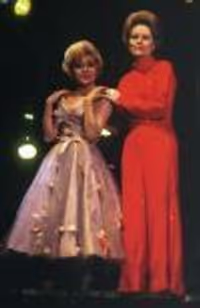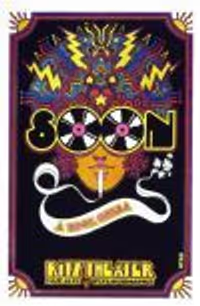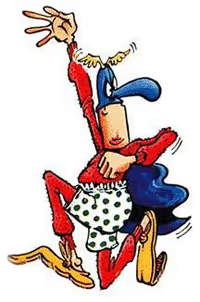Memories of FOLLIES from the NY Times
#1Memories of FOLLIES from the NY Times
Posted: 8/26/11 at 10:47am
Interesting compilation of memories from those theater folk who saw the original FOLLIES. I'm sort of curious as to why Galt MacDermot's was even printed. Is he still bitter over losing best score in '72? Were they hard pressed for comments?
But read and enjoy.
Link
#2Memories of FOLLIES from the NY Times
Posted: 8/26/11 at 11:16am
I don't think MacDermot's quote is bitter; keep in mind at the time, a lot of people greatly preferred the theatrical experience of TWO GENTLEMEN OF VERONA. But that aside - Most of the people asked to remember are the kinds of theatrical gypsys for whom FOLLIES has always had an especial appeal. MacDermott was a jazz / rock composer - he certainly wasn't the only person in 1972 who didn't 'get' the appeal of FOLLIES.
#2Memories of FOLLIES from the NY Times
Posted: 8/26/11 at 11:21amMaybe because I'm so biased, I was looking for a puff piece with quotes like Tommy Tune's all the way through. MB, your explanation makes a lot of sense.
#3Memories of FOLLIES from the NY Times
Posted: 8/26/11 at 11:37amObviously, the article was created mostly to be a lovely homage to the work, but yes, it would have been fun to have interviewed some more out-of-the box personalities to see what kind of real impact FOLLIES had on a more widespread audiences.
mamaleh
Broadway Legend Joined: 5/11/04
#4Memories of FOLLIES from the NY Times
Posted: 8/26/11 at 11:37amInteresting quotes. I was a student at the time and had liked HAIR so expected to love TWO GENTLEMEN OF VERONA. I saw it for free in the park, thought it so-so (except for the fun song, "Night Letter") and didn't bother to see its commercial run. On the other hand, I ended up loving FOLLIES so much that I saw it four times--the first show I'd ever revisited that many times. I guess it was the score and the performances, especially John McMartin's, that got to me. I sure as heck didn't quite get the bitterness and regret aspect yet at my then-tender age. Haven't seen the new production yet, but the Paper Mill one was an eye-opener to me in terms of the richness of the themes. I was ready to understand them then. Since that summer of 1971 it has remained my favorite musical.
#5Memories of FOLLIES from the NY Times
Posted: 8/26/11 at 12:53pm
I love how Elaine managed to work in a plug for her cabaret show.
Only her.
And that's why I love her.
#6Memories of FOLLIES from the NY Times
Posted: 8/26/11 at 1:59pmi saw FOLLIES right after it opened on Broadway...I flew in from Los Angeles because a good friend of mine here in New York, said he could get us tickets...I was to say the least OVERWHELMED by the whole experience of the show...and i too distinctly remember the vast emptyness of the theatre when the curtain went up...and in my mind i can still visualize even today those Burlesgue-style dancers walking around as ghostysof Burlesgue dancers from that era, they were very tall...that was very haunting for me...and of course i remember ALEXIS SMITH...WOW!...
#7Memories of FOLLIES from the NY Times
Posted: 8/26/11 at 2:14pm
I love how they don't bother to correct Guare's mistaken memory of Alexis Smith singing "Can That Boy Foxtrot" and "I'm Still Here."
And MacDermot? The less said, the better. He had a very brief period of musical relevance and that window closed a long, long time ago. I'm sure he's very bitter. Rich, but bitter.
#8Memories of FOLLIES from the NY Times
Posted: 8/26/11 at 2:20pmTruly newintown, I don't think thats the case. MacDermott's career has always been based in Jazz and orchestral and he's been hugely successful in that arena. I don't think this is a case of a composer who hungered for more Broadway success and didn't get it.
#9Memories of FOLLIES from the NY Times
Posted: 8/26/11 at 3:16pm
I thought the piece perfectly captured my experience in 1971: I was dazzled by it, like Tommy Tune--and I really appreciated his detailed recall of the effect of the opening--but I was surrounded by people who just didn't get it. I felt alone liking it. EVERYONE else either hated it or was left cold.
In the Times piece, I think it's sweet that William Ivey Long, a genius costume designer himself, remembers it as being ALL about Florence Klotz's genius costumes. Well, they were genius, but so was so much else about the show.
I think it's funny that John Guare was so excited about being bussed to the Bronx that he confuses Alexis Smith and Yvonne De Carlo. (And I think it's odd that the NY Times obviously doesn't employ any gay fact checkers.)
Barbara Cook's memory is how I remember so many people responding to me when I said I loved it: "I just didn't care about any of the characters."
And Jack Viertel and Galt McDermot reflect that 1971 was basically still part of the 1960s, and the Broadway musical was passe. As Viertel says, that's what Follies was about, but that went over the head of those who didn't respond to the musical.
My memory is simple: I was 15 in 1971 and thought it was the greatest thing I had ever seen. I'm 55 now and still do.
#10Memories of FOLLIES from the NY Times
Posted: 8/26/11 at 3:21pm
The article and this thread reminded me of the letter below, sent to the Times right after the show opened, as a rebuttal to Clive Barnes pan. It really shows how Follies incited great passion right out of the gate. And look who wrote it!
To the Editor:
It is probably foolish (in some circles it might be considered suicidal) for an actor to criticize a critic, but I feel I must put in my two cents worth.
Clive Barnes has been wrong a few times in the past, but in the matter of Follies he is criminally mistaken. He has done a terrible disservice to the Times and its readers. Follies is the most beautiful, touching, exciting and, God help us relevant piece of theater I have ever seen.
I have been working in the theater and loved it for the past 19 years. On the opening night of Follies I was a member of that supposed audience of shills and well-wishers who Mr. Barnes thinks should be rented out for all occasions. I stood and cheered. The last time I did that was for Laurence Olivier in The Entertainer. This is an entire stage full of Entertainers.
Jerry Orbach
New York.
#11Memories of FOLLIES from the NY Times
Posted: 8/26/11 at 3:47pm
God bless Jerry Orbach.
Barnes never did like FOLLIES. When it was revived at Encores!, I remember his review was pretty mixed too, as compared to John Simon who hated it in 1971 and now calls it the greatest musical ever.
#12Memories of FOLLIES from the NY Times
Posted: 8/26/11 at 3:56pmI can't wait for the production at Chicago Shakespeare Theatre in October! This show is pure theatrical magic and conjures so much emotion I can barely take it. Go Jerry Orbach!
#13Memories of FOLLIES from the NY Times
Posted: 8/26/11 at 4:37pm
Galt MacDermot is actually one of the least bitter people I've ever met. He's a jazz musician at heart that got tapped to compose some scores for Broadway, and one of them became a once-in-a-lifetime blockbuster. That's left him able to do exactly what he wants ever since, which involves raising a lovely family in a nice trim home on Staten Island. He's got his band, he plays his music, and he's revered as a God by the hardcore Hip-Hop community who use his old jazz records as samples all the time.
He's never really a part of the theatre "scene" - he's all about his music. I can assure you he cares less about Tony awards than just about anybody else on Broadway ever.
Gaveston2
Broadway Legend Joined: 6/28/11
#14Memories of FOLLIES from the NY Times
Posted: 8/26/11 at 4:55pm
newintown is exactly right. Of course MacDermott is resentful. In 1971, he was widely proclaimed as the "future of Broadway" while Follies was a last gasp by people from his parents' generation. No less a pseudo-expert than Clive Barnes of the NY Times had declared at the opening of Hair that all future Broadway musicals would have rock scores.
And while MacDermott's Hair currently enjoys a successful revival, it's the second major revival of that show while Follies enjoys its third or fourth. Who dominated critical attention on Broadway for the past 40 years? Hint: it wasn't MacDermott (much as I may personally like his music).
#15Memories of FOLLIES from the NY Times
Posted: 8/26/11 at 5:21pm
How on earth is MacDermott being bitter or resentful? Follies is having its 2nd Broadway revival. Hair had two Broadway revivals (though the first was hardly a "revival"). But what does it matter? Hair is one of the most internationally successful musicals ever written. Follies is not. Hair made money. Follies did not. Two Gentlemen of Verona won Best Musical. Follies did not. Both Hair and Follies were considered revolutionary shows for completely different reasons.
To me, MacDermott sounds sincere, which is very different from resentful. I love Two Gentlemen of Verona and I'm not a fan of Follies. It happens. He simply stated that at the time, he didn't feel like Follies was a breakthrough musical. And given his perspective and background, it actually makes sense.
Gaveston2
Broadway Legend Joined: 6/28/11
#16Memories of FOLLIES from the NY Times
Posted: 8/26/11 at 5:33pm
Fair enough, Matt. You're right to the extent that MacDermott was describing his reaction in 1971, and he wasn't alone back then in believing Follies and Sondheim were stuck in the past. Perhaps he went on to acknowledge how time has proven the enduring power of the work (particularly the score), but that part of his quote was omitted by the Times.
I don't know the man, but assuming he is human, however, it can't have escaped his notice that despite the commercial success and influence of Hair, it is Sondheim who is has been canonized in intervening years.
Or maybe it still rankles MacDermott that he was never able to repeat the success of Hair. As anyone who has heard the score to "Two Gentlemen" can attest.
#17Memories of FOLLIES from the NY Times
Posted: 8/26/11 at 6:21pm
Actually, I consider Two Gentlemen's score to be as good as Hair, though it was written for an entirely different type of show. And The Human Comedy was critically acclaimed Off-Broadway, but couldn't translate to a larger stage.
Sondheim has been canonized for his body of work, which makes sense. And he's been canonized in a way that is unique to any other American musical theatre composer. I'm not sure MacDermott has ever considered himself in competition with Sondheim any more than...anyone else. Probably less so since Broadway was never his main focus. It sounds like ulterior motives are being assigned to his statement simply because he didn't fall in step.
All the quotes are about the reactions to seeing the first production of Follies. MacDermott was obviously asked to say something since his quote was up against the Tony that season and his musical beat Follies for Best Musical. He said what he felt when he saw the show. Why should he have to go on about the enduring (critical and academic) power of the work? That would just be a digression. Follies isn't for everyone. It has nothing to do with jealousy or bitterness.
Gaveston2
Broadway Legend Joined: 6/28/11
#18Memories of FOLLIES from the NY Times
Posted: 8/26/11 at 7:40pm
Matt, I defer to you and others who know MacDermott and say he isn't a bitter person by nature.
But his specific quote to the Times speaks in terms of FOLLIES as a "counterrevolution". As such he directly oppose FOLLIES with the supposed "revolution" represented by his own work in HAIR.
"Bitter" may be too strong a word, but it is MacDermott himself who declares a war of sorts against Sondheim and opens the door to a questioning of his motives.
#19Memories of FOLLIES from the NY Times
Posted: 8/26/11 at 7:52pmBitter might be the wrong word, yes, but the comment was in bad taste. I'm with Sondheim-- if you have nothing nice to say (about your fellow writers), don't say anything at all.
After Eight
Broadway Legend Joined: 6/5/09
#20Memories of FOLLIES from the NY Times
Posted: 8/26/11 at 8:26pm
". Perhaps he went on to acknowledge how time has proven the enduring power of the work (particularly the score), but that part of his quote was omitted by the Times. "
Why surmise such a thing if nothing in the quotation even hints at it?
As for its "enduring power," enduring to whom?
A critical elite?
A cult of devotees?
General audiences?
Gaveston2
Broadway Legend Joined: 6/28/11
#21Memories of FOLLIES from the NY Times
Posted: 8/26/11 at 9:57pm
A critical elite and a cult of devotees, as you know perfectly well, After Eight. Follies doesn't pander to an audience by telling them fairy tales they want to hear; it will never be a universally popular success.
Your avowed venom toward FOLLIES' alleged negativity would be more credible if I hadn't found you singing the praises of CHICAGO on a thread discussing CHICAGO's long run.
CHICAGO is surely the most cynical of all Broadway hit musicals and makes FOLLIES look like the SOUND OF MUSIC by comparison. (Before you accuse me of contradiction, CHICAGO points its cynicism at institutions such as the government and the press, making it easier to swallow for people who think of themselves as separate from both institutions.)
After Eight
Broadway Legend Joined: 6/5/09
#22Memories of FOLLIES from the NY Times
Posted: 8/27/11 at 9:03am
"Follies doesn't pander to an audience by telling them fairy tales they want to hear; it will never be a universally popular success."
Oh, no! Not that old, tired, nose in the air superiority schtick again. The fallback position of those that can't come up with any valid arguments. Frankly, I wouldn't have expected that from someone as intelligent as you.
And although you told me not to allude to contradiction, I'm going to do just that. Because are you saying that great musicals and popular successes like Show Boat, South Pacific, West Side Story, Fiddler, or even Chicago "pander" to audiences by telling them " fairy tales" they want to hear?
As for Chicago, yes it's cynical, but it's also a lot of fun. Follies is not. It's also far more expertly written. It's sleeker, smoother, and much sharper. And most importantly, its tenets are truer; those in Follies are simply specious and mean-spirited.
#23Memories of FOLLIES from the NY Times
Posted: 8/27/11 at 12:09pmSo this is how I saw MacDermott's comment...I don't think he was using the term "revolutionary" with regards to waging any war against Sondheim or Broadway. The term is often used loosely to refer to anything innovative that inspires new trends and ways of viewing things. To me, he was speaking of content. Hair was revolutionary because it was so rooted in the politics, issues, people, opinions and sounds of the time it was written. To that effect, it would make sense Follies would be counterrevolutionary because its content was rooted in the past, memories, a forgotten era, and regret. Follies may have been revolutionary in its structure and staging (to an extent), but it is a musical about the past while Hair was about the present. Two Gentlemen of Verona was an infusion of the past (text) and present (staging and score). I found his comment thought-provoking as it is most definitely from a very different perspective and not in poor taste at all. I found it far more interesting than yet more gushes and raves, which are a dime-a-dozen. It seems less like motive for war than simply a reflection on what he witnessed at the time. There doesn't seem to be any implication that he has anything personally against Sondheim or his works. If so, then ANY criticism towards anything Sondheim has written would have to be taken as a personally driven attack on the man and his work, which would make sense if there was some evidence of a history of animosity. I really don't think there is any here.
#24Memories of FOLLIES from the NY Times
Posted: 8/27/11 at 12:38pm
As for Chicago, yes it's cynical, but it's also a lot of fun. Follies is not. It's also far more expertly written. It's sleeker, smoother, and much sharper. And most importantly, its tenets are truer; those in Follies are simply specious and mean-spirited.
Oh no, not that tired Kander/Ebb-vs.-Sondheim competition.
Oh no, not that tired opinion-as-fact argument.
Follies happens to be "a lot of fun" to a lot of people. They are both great musicals that do not need to be set against each other in order to praise them. Chicago is not "far more" this or that than Follies not are its "tenets" (since when do musicals have tenets?) are not truer. Nor is either musical "specious."
("Specious tenets"? Oy vey.)
And both could be considered mean-spirited...but only by people who are mean-spirited.
Videos







